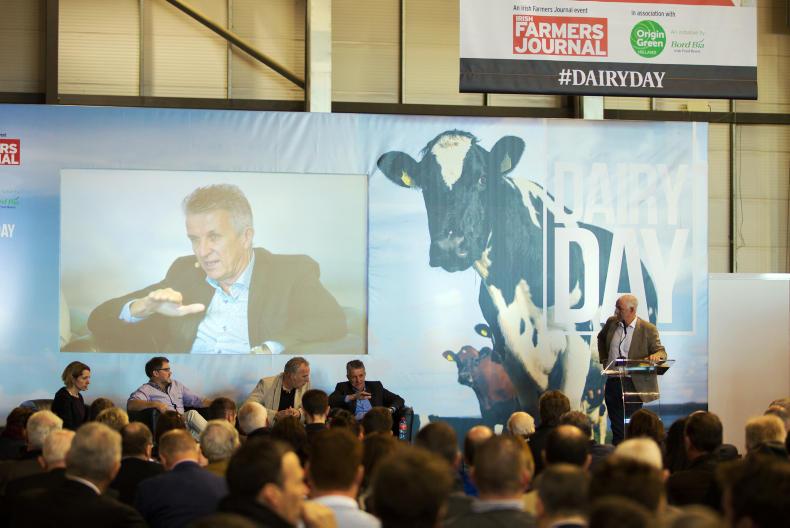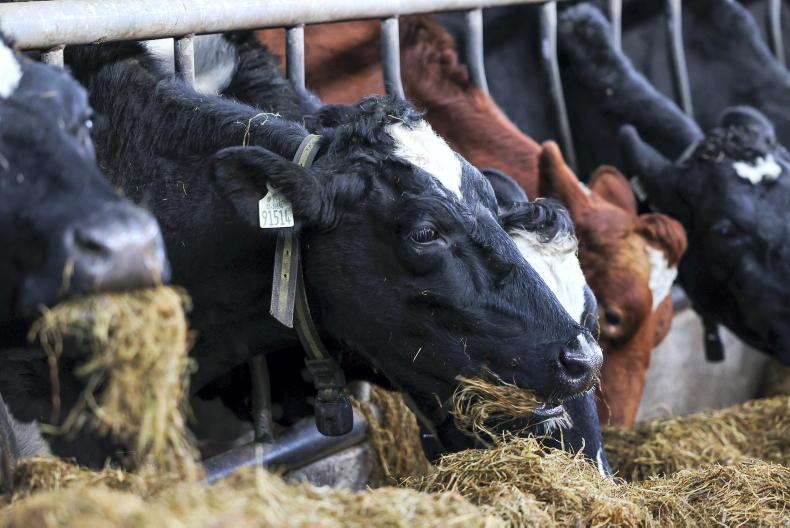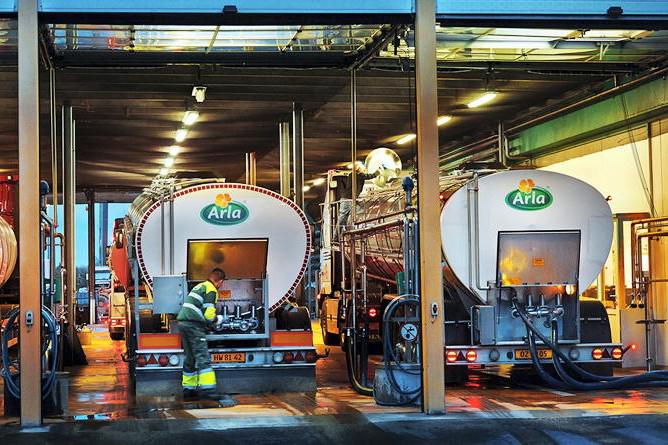There are three stages at Dairy Day 2018, with one stage focusing on issues outside the farm gate. Last year, on this stage we had the chairs of all the co-ops up to discuss visions and plans for their co-op as dairy farms expanded and developed.
North and south, the message from the chairs was that the development and equipment was now in place in Ireland and the next stage of the development process was to add value to the milk to deliver a better milk price.
With these comments, the theme for the this year’s stage was born – adding value to milk.
The Irish dairy industry is vibrant, growing and looking for new opportunities. Where is the future for added value in the dairy chain? What milk prices can farmers expect in five and 10 years’ time?
We hope to get some answers to these questions at Dairy Day on Tuesday 20 November 2018 in Punchestown.
The first session on this stage will focus on understanding milk and making the most of it. There is a lot of talk in the industry on the alternative juices that are supposedly replacing milk in diets and available in shops all over the country.
Dietician Orla Walsh will set out to discuss the merits of milk and debunk the myths of the dairy-free diets.
Empowerment
The objective of the session is to empower farmers with knowledge of the topic so that they can discuss sensibly the merits of dairy diets at home and abroad so that dairy proteins can get a fair hearing.
The second session is all about adding value to dairy and the intention is to use international best practice to map the right direction for Irish dairy companies.
Yes, many of our dairy companies are already playing in this space and returning value to farmers, but many more are still only climbing up the value ladder.
We will have an Irish industry overview from Irish Farmers Journal agribusiness editor Eoin Lowry as he explains how Irish companies are already adding value.
Following that, James Caffyn from GIRA market intelligence will explain how global dairy companies are adding value to dairy product successfully and returning better milk prices to farmers.
James is a respected consultant with GIRA and has a great handle on what is happening in other leading dairy-producing countries.
Following that, Roisin Hennerty, CEO Ornua Foods Americas and global marketing director, will give an overview of the US market.
Padraig Brennan, director of markets with Bord Bia, is just back from an international trade mission and he will discuss the dairy growth anticipated in Chinese and Asian market.
Session three is about understanding how dairy trade works and what the milk price outlook is on key dairy commodities for the next 12 months.
We will hear from US dairy farmer Llyod Holterman from Wisconsin in the US as he explains how he trades milk.
Then we will hear from experts in trading – Rik Loeters, director, Trigona Dairy Trade, Netherlands, and Lucas Fuess, director, Market Intelligence Higher Ground, Chicago, US.
Dairy markets
John Lancaster, head of EU Dairy Consulting, INTL FCStone Ireland, will also participate in this session, so if farmers don’t understand what is coming next on dairy markets or what to expect then it won’t be the fault of the speakers.
The final session on this stage is the whole debate over climate change and the environment and what are the challenges and solutions for a growing dairy sector.
We will start with John Fitzgerald, chair of the Climate Change Advisory Council, ESRI, and Trinity College Dublin, describing the challenge and then we will hear from voices working in the sector about what and how farmers can manage this challenge.
Noel Meehan from Teagasc will describe what’s happening with the Teagasc and the Dairy Sustainability Ireland initiative on managing nutrients and water from dairy farmers. Ciaran Fitzgerald, food economist with over 30-year experience in the food industry will describe the facts on climate change and the dairy food chain.
Finally John Muldowney, Department of Agriculture, Climate change and Bioenergy policy division, will outline the key challenges and solutions to the climate change limits and targets on farming.
Stage 1 of 3
Beyond the farmgate: overall theme – adding value to milk
Session 1: 9.30am to 10.30am – Understanding milk.Session 2; 10.30am to 12pm – Adding value to Irish dairy products.Session 3; 12pm to 1.30pm – Outlook for Irish milk prices.Session 4; 1.30pm to 3pm – Cows, the environment and climate change.For more detail on other stages, see Dairy Day supplement pages 16, 17 and back cover.
Dairy Day timetable
Beyond the farm gate: overall theme – adding value to milk
The Irish dairy industry is vibrant, growing and looking for new opportunities. Where is the future for added value in the dairy chain? What milk prices can farmers expect in five and 10 years’ time?
Session 1: 9.30 to 10.30
Understanding milk and making the most of it
Moderator: Amii McKeever, editor, Irish Country Living.
Orla Walsh, self-employed dietitian: The value of dairy – debunking the myths on dairy-free diets.Teddy Cashman, dairy farmer and chair of the NDC: How can dairy farmers meet the challenges of a fast-changing consumer?Session 2: 10.30 to 12.00
Adding value to dairy – using international best practice to map the right direction for Irish dairy companies.
Moderator: Jack Kennedy, deputy editor, Irish Farmers Journal.
Eoin Lowry, agribusiness editor and deputy editor, Irish Farmers Journal: The Irish dairy Industry overview – what Irish companies are adding value?James Caffyn, GIRA Market intelligence: what global dairy companies are adding value to dairy product successfully and returning better milk prices to farmers? Roisin Hennerty, CEO Ornua Foods Americas and global marketing director: The US market – a perspective.Padraig Brennan, director of markets with Bord Bia: Dairy growth anticipated in Chinese/Asian market? Session 3: 12.00 to 1.30
Understanding how dairy trade works and what is the milk price outlook on key dairy commodities for the next 12 months?
Jack Kennedy to interview US dairy farmer Llyod Holterman, Wisconsin, US.Moderator: Lorcan Allen, Irish Farmers Journal.
Rik Loeters, director, Trigona Dairy Trade, Netherlands.Lucas Fuess, director, Market Intelligence Higher Ground Chicago, US.John Lancaster, head of EU dairy consulting, INTL FCStone.Session 4: 1.30 to 3pm
Climate change and the Environment – what are the challenges and solutions for a growing dairy sector?
Introduction to session:
VIDEO: John Fitzgerald, chair, Climate Change Advisory Council; ESRI and Trinity College Dublin.Moderator: Thomas Hubert, Irish Farmers Journal.
Noel Meehan, Teagasc: What’s happening with the Teagasc and the Dairy Sustainability Ireland initiative on managing nutrients from dairy farmers?Ciaran Fitzgerald, food economist with over 30 year experience in the food industry: What are the facts on climate change and the dairy food chain?John Muldowney, Department of Agriculture: Key challenges and solutions to the climate change limits and targets on farming.
There are three stages at Dairy Day 2018, with one stage focusing on issues outside the farm gate. Last year, on this stage we had the chairs of all the co-ops up to discuss visions and plans for their co-op as dairy farms expanded and developed.
North and south, the message from the chairs was that the development and equipment was now in place in Ireland and the next stage of the development process was to add value to the milk to deliver a better milk price.
With these comments, the theme for the this year’s stage was born – adding value to milk.
The Irish dairy industry is vibrant, growing and looking for new opportunities. Where is the future for added value in the dairy chain? What milk prices can farmers expect in five and 10 years’ time?
We hope to get some answers to these questions at Dairy Day on Tuesday 20 November 2018 in Punchestown.
The first session on this stage will focus on understanding milk and making the most of it. There is a lot of talk in the industry on the alternative juices that are supposedly replacing milk in diets and available in shops all over the country.
Dietician Orla Walsh will set out to discuss the merits of milk and debunk the myths of the dairy-free diets.
Empowerment
The objective of the session is to empower farmers with knowledge of the topic so that they can discuss sensibly the merits of dairy diets at home and abroad so that dairy proteins can get a fair hearing.
The second session is all about adding value to dairy and the intention is to use international best practice to map the right direction for Irish dairy companies.
Yes, many of our dairy companies are already playing in this space and returning value to farmers, but many more are still only climbing up the value ladder.
We will have an Irish industry overview from Irish Farmers Journal agribusiness editor Eoin Lowry as he explains how Irish companies are already adding value.
Following that, James Caffyn from GIRA market intelligence will explain how global dairy companies are adding value to dairy product successfully and returning better milk prices to farmers.
James is a respected consultant with GIRA and has a great handle on what is happening in other leading dairy-producing countries.
Following that, Roisin Hennerty, CEO Ornua Foods Americas and global marketing director, will give an overview of the US market.
Padraig Brennan, director of markets with Bord Bia, is just back from an international trade mission and he will discuss the dairy growth anticipated in Chinese and Asian market.
Session three is about understanding how dairy trade works and what the milk price outlook is on key dairy commodities for the next 12 months.
We will hear from US dairy farmer Llyod Holterman from Wisconsin in the US as he explains how he trades milk.
Then we will hear from experts in trading – Rik Loeters, director, Trigona Dairy Trade, Netherlands, and Lucas Fuess, director, Market Intelligence Higher Ground, Chicago, US.
Dairy markets
John Lancaster, head of EU Dairy Consulting, INTL FCStone Ireland, will also participate in this session, so if farmers don’t understand what is coming next on dairy markets or what to expect then it won’t be the fault of the speakers.
The final session on this stage is the whole debate over climate change and the environment and what are the challenges and solutions for a growing dairy sector.
We will start with John Fitzgerald, chair of the Climate Change Advisory Council, ESRI, and Trinity College Dublin, describing the challenge and then we will hear from voices working in the sector about what and how farmers can manage this challenge.
Noel Meehan from Teagasc will describe what’s happening with the Teagasc and the Dairy Sustainability Ireland initiative on managing nutrients and water from dairy farmers. Ciaran Fitzgerald, food economist with over 30-year experience in the food industry will describe the facts on climate change and the dairy food chain.
Finally John Muldowney, Department of Agriculture, Climate change and Bioenergy policy division, will outline the key challenges and solutions to the climate change limits and targets on farming.
Stage 1 of 3
Beyond the farmgate: overall theme – adding value to milk
Session 1: 9.30am to 10.30am – Understanding milk.Session 2; 10.30am to 12pm – Adding value to Irish dairy products.Session 3; 12pm to 1.30pm – Outlook for Irish milk prices.Session 4; 1.30pm to 3pm – Cows, the environment and climate change.For more detail on other stages, see Dairy Day supplement pages 16, 17 and back cover.
Dairy Day timetable
Beyond the farm gate: overall theme – adding value to milk
The Irish dairy industry is vibrant, growing and looking for new opportunities. Where is the future for added value in the dairy chain? What milk prices can farmers expect in five and 10 years’ time?
Session 1: 9.30 to 10.30
Understanding milk and making the most of it
Moderator: Amii McKeever, editor, Irish Country Living.
Orla Walsh, self-employed dietitian: The value of dairy – debunking the myths on dairy-free diets.Teddy Cashman, dairy farmer and chair of the NDC: How can dairy farmers meet the challenges of a fast-changing consumer?Session 2: 10.30 to 12.00
Adding value to dairy – using international best practice to map the right direction for Irish dairy companies.
Moderator: Jack Kennedy, deputy editor, Irish Farmers Journal.
Eoin Lowry, agribusiness editor and deputy editor, Irish Farmers Journal: The Irish dairy Industry overview – what Irish companies are adding value?James Caffyn, GIRA Market intelligence: what global dairy companies are adding value to dairy product successfully and returning better milk prices to farmers? Roisin Hennerty, CEO Ornua Foods Americas and global marketing director: The US market – a perspective.Padraig Brennan, director of markets with Bord Bia: Dairy growth anticipated in Chinese/Asian market? Session 3: 12.00 to 1.30
Understanding how dairy trade works and what is the milk price outlook on key dairy commodities for the next 12 months?
Jack Kennedy to interview US dairy farmer Llyod Holterman, Wisconsin, US.Moderator: Lorcan Allen, Irish Farmers Journal.
Rik Loeters, director, Trigona Dairy Trade, Netherlands.Lucas Fuess, director, Market Intelligence Higher Ground Chicago, US.John Lancaster, head of EU dairy consulting, INTL FCStone.Session 4: 1.30 to 3pm
Climate change and the Environment – what are the challenges and solutions for a growing dairy sector?
Introduction to session:
VIDEO: John Fitzgerald, chair, Climate Change Advisory Council; ESRI and Trinity College Dublin.Moderator: Thomas Hubert, Irish Farmers Journal.
Noel Meehan, Teagasc: What’s happening with the Teagasc and the Dairy Sustainability Ireland initiative on managing nutrients from dairy farmers?Ciaran Fitzgerald, food economist with over 30 year experience in the food industry: What are the facts on climate change and the dairy food chain?John Muldowney, Department of Agriculture: Key challenges and solutions to the climate change limits and targets on farming. 









SHARING OPTIONS